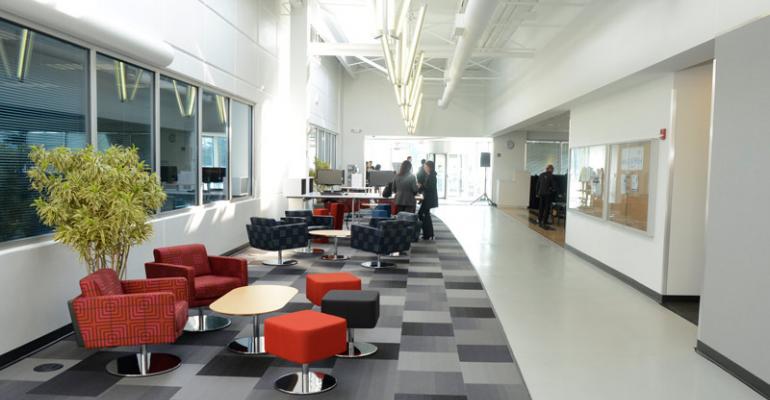LIBERTYVILLE, IL – Volkswagen Credit wants to boost the number of loans it originates to car buyers and dealers as it grows along with the VW and Audi brands in the U.S.
VW and Audi, combined, are targeting 1,000 annual U.S. sales by 2018, up from 2012’s 577,443, WardsAuto data shows.
“If (the) Volkswagen (brand) sells 100 cars, we get 60% of them (for financing),” Christian Dahlheim, executive vice president and chief financial officer-Volkswagen Credit, says at the grand opening of the financial service unit’s expanded U.S. headquarters here.
The 60% rate has been the average for some time, but Dahlheim says VW Credit, the captive- financing arm of Germany’s Volkswagen Group, wants to write loans for “about 65%” of every 100 VWs and Audis sold in the U.S. He does not disclose a goal for Audi, but says VW Credit finances 54% of all Audis sold in the market.
Car buyers who finance their vehicles tend to purchase a more expensive grade of vehicle and be loyal to the brand, while those who finance through a captive lender are even more loyal, Dahlheim notes.
“There’s a big difference between captive financing and non-captive financing,” he says. “We make every effort to make sure the customer comes back.”
U.S. car buyers finance their vehicles more often than do consumers in other developed countries, Dahlheim says. Typically, about 90% of Americans seek loans from lending firms for their vehicle purchase compared with China, where 90% of buyers pay cash.
VW Credit wants to increase transactions with its U.S. dealers, as well. The financial unit currently does business with about 50% of VW and Audi dealers, mainly by loaning them money to stock their showrooms with models, known as floorplan financing.
“We want to increase that to 60%-65%,” Dahlheim says.
The Detroit Three make loans to slightly more than 50% of their dealers, he says, adding that the U.S. retail network, with many dealers selling a variety of brands, can make the task more difficult.
“By nature of the U.S. and multi-brand dealers, we’ll never get to 100%,” Dahlheim says. “We’d be happy with 70%, but 60% is a realistic goal.”
VW Credit’s U.S. loan accounts last year numbered 950,873, up 13.4% from 2011 and split 559,546 retail/391,327 lease. Of those, first-time loan contracts jumped 28.3% to 404,947.
In monetary terms, VW’s U.S. lending arm last year held $10.0 billion in lease assets and $9.7 billion in retail assets, plus $2.5 billion in wholesale assets. The leasing figure is higher because the luxury Audi brand tends to be leased more often than does the Volkswagen brand, Dahlheim says.
VW Credit’s total assets for 2012 increased 17.5% to a record $23 billion, the financial unit says.
Demographically, those purchasing or leasing a vehicle through Volkswagen Credit tend to closely match the background of all VW and Audi buyers in the U.S. Both brands typically sell to more well-heeled customers than their competitors and have a higher share of Generation X and Y buyers.
Dahlheim estimates 80% of Audi buyers in the U.S. have credit scores in the “excellent” range of 750-plus points, while VW-brand buyers, surprising even to VW, aren’t too far behind. He declines to reveal the 2012 delinquency rate for VW Credit in the U.S., but says there has been improvement since the 2008-2009 global economic downturn.
The improving economy has not caused VW to tighten its lending standards, unlike certain banks. “I would say over the past four to five years we have not changed anything in our credit policy,” Dahlheim says. “We have an acceptance rate way above 90% for both brands.”
As part of its $10 million, 30,000-sq.-ft. (2,787-sq.-m) expansion here in suburban Chicago, Volkswagen Credit by 2018 will add 150 jobs in customer care, information technology, underwriting and origination, and support and administrative functions.
VW Credit Libertyville, opened in 1999, already has added more workstations and conference rooms, expanded the dining area and installed a new fitness facility. It also has upgraded its videoconferencing system.
VW Credit in the U.S. currently employs 1,100 workers, with about 530 at Libertyville.
A second location in Portland, OR, is home to about 240 workers, while a facility in Auburn Hills, MI, dedicated to remarketing and lease-end services employs 185.
Some 60 U.S. VW Credit employees are housed at the Volkswagen Group’s U.S. headquarters in Herndon, VA. The auto-lending firm operates regional offices in California, Georgia, New Jersey and Texas.
Volkswagen of America 2012 sales surged 35.1% to 438,133 units, the auto maker’s third consecutive year of double-digit growth in the U.S. Audi of America deliveries last year jumped 18.5% to 139,310.





